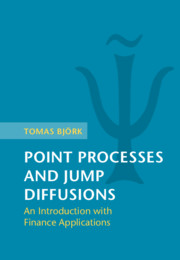Refine search
Actions for selected content:
2 results
16 - Basic Arbitrage Theory
- from Part V - Applications in Financial Economics
-
- Book:
- Point Processes and Jump Diffusions
- Published online:
- 27 May 2021
- Print publication:
- 17 June 2021, pp 173-187
-
- Chapter
- Export citation

Point Processes and Jump Diffusions
- An Introduction with Finance Applications
-
- Published online:
- 27 May 2021
- Print publication:
- 17 June 2021
